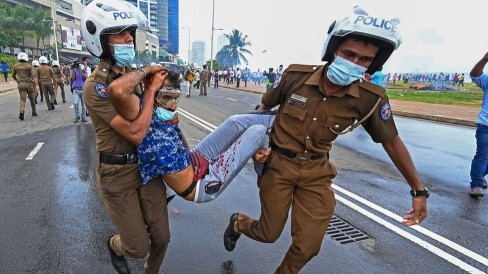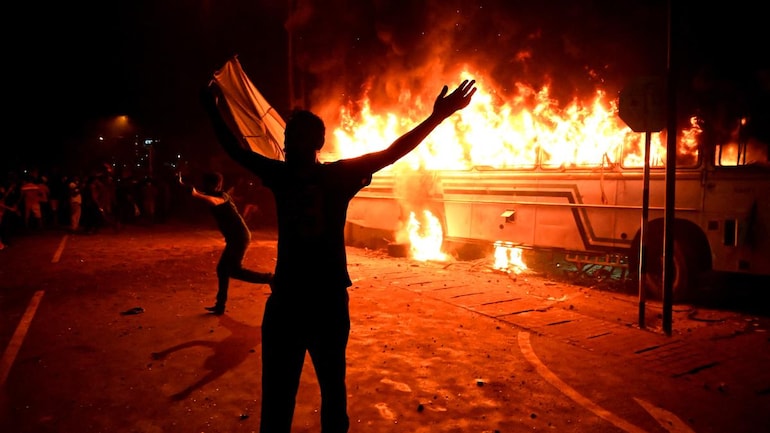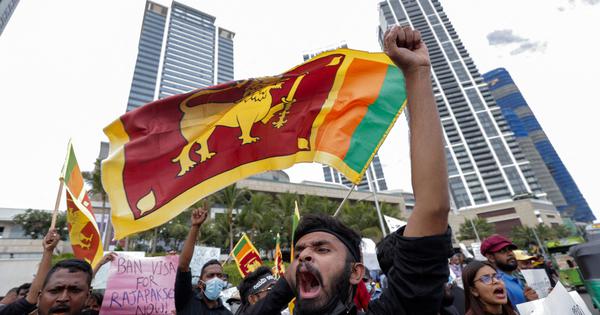Sri Lanka has plunged into a deep economic crisis due to decades of economic mismanagement. The island nation is facing severe shortage of basic resources, including food grains that has led to widespread violent protests. Prof. Adluri Subramanyam Raju, Dean-International Relations, Pondicherry University tells Sadiksha Waiba Sub-Editor News Intervention that borrowing money from China at high interest rates and the lack of transparency and corruption in awarding mega projects should have been avoided.
Sadiksha Waiba: Sri Lanka, though having a small economy, has a per capita income which is higher than that of India and the human development index too was apparently better. What then led to such a massive crisis in Sri Lanka?
Adluri Subramanyam Raju: There are several factors that led to crisis in Sri Lanka: impact of Covid-19 pandemic, misgovernance, debt mismanagement, foreign exchange crisis, lack of transparency, family government instead of the Sri Lankan government introduced populist schemes such as tax cuts (that were) implemented in 2019, removal of capital gains tax, external crisis (Russia-Ukraine war), etc. These factors had an impact on the tourism industry, energy and food crisis and reduction of foreign remittance drastically.
Sadiksha Waiba: Sri Lanka has had a history of being run by members of the same family, whether it is President Gotabaya Rajapaksa, ex Prime Minister Mahinda Rajapaksa who is elder brother to the President and other ministers in the government who are all from the same family. They have even been imprisoned on charges of corruption in the past and it is said that the power was concentrated in the hands of a single family which also led to the failure of the government. Why is it then that the people still vote for the Rajapaksa family?
Adluri Subramanyam Raju: In developing countries, people are largely influenced by popular schemes and Sri Lanka is no exception. People were being attracted by the popular schemes, hyper nationalism, etc. Majority people, being Buddhists, are happy with the Rajapakse government’s actions against the Tamils, which led the majority people (Sinhalese) to support the Rajapaksa family
Sadiksha Waiba: What government policies do you think could have been changed to avert such a crisis?Adluri Subramanyam Raju: Policies such as avoiding borrowing money from China with a high interest, anticipating the future challenges; transparency; forcing the farmers to depend on organic cultivation; tax to be collected from the employees, ethnic harmony; an alternative vision for development; accommodating minority groups into mainstream; freedom of expression etc. Further, the Sri Lankan government forgot the fact that the northern and eastern parts of Sri Lanka are parts of Sri Lanka only and development of these areas reflects on the country’s growth. Most of these areas are still under the control of security forces and bunkers are yet to be removed.

Sadiksha Waiba: In 2008, Sri Lankan ministers decided to invest in Hambantota for revenue generation by building a port similar to the Colombo business port and that’s when they loaned money from China. However, the project was not successful. Why did the project fail? Did it lead to a debt trap?
Adluri Subramanyam Raju: Construction of Hambantota port was taken as a prestigious project by the then President Mahinda Rajapaksa. However, the government did not look at the cost and benefit before having an agreement with China to construct the port in Hambantota. The port does not generate revenue, like Colombo Port. It is largely used by India while exporting its goods to abroad. It was reported that rampant corruption was involved in the project while obtaining funds from China. Neither the people of Sri Lanka in general nor people of Hambantota were/are benefitted through the Port.
Sadiksha Waiba: It’s being said that China and it’s high interest loans are responsible for the crisis in Sri Lanka. Your views.
Adluri Subramanyam Raju: Sri Lankan government gave various projects to Chinese companies without any bidding, which had given space for rampant corruption. Apart from loans taken from China, other policies are coupled for the present situation.
Sadiksha Waiba: Do you see more economies (Pakistan, Africa, etc) crashing wherever China is involved?Adluri Subramanyam Raju: As long as the aid is given by China without transparency, the respective governments tend to involve in corruption, which leads to mis-governance. Further, as said earlier, most of the aid was taken away by China through salaries of its own people who are employed and for supply of its own material in the projects. This is against the international norms.

Sadiksha Waiba: Sri Lanka is a tourism based economy.12.6% of Sri Lanka’s GDP is from tourism. In 2019 there were attacks on the tourism sector, the primary source of income, which led to a fiscal deficit in the country. Does that mean that the Sri Lankan economy was already crumbling before the onset of Covid or is Covid responsible for the current state of affairs as is being projected?
Adluri Subramanyam Raju: One cannot ignore that the Covid pandemic as one of the factors that caused the present crisis in Sri Lanka.
Sadiksha Waiba: How did an agricultural policy cause a food shortage in Sri Lanka?
Adluri Subramanyam Raju: Rajapaksa government banned the import of fertilizers and insisted the farmers to depend on organic farming. This decision was taken to reduce the Sri Lankan foreign debt. However, that decision caused food crisis in Sri Lanka.
Sadiksha Waiba: How long do you think it will take for course correction?
Adluri Subramanyam Raju: Until Sri Lanka looks for an alternative vision, apart from correcting its previous policies.
Sadiksha Waiba: Do you think the appointment of the new Prime Minister Ranil Wickremesinghe will be able to change the game and elevate the country from the crisis that they are in?
Adluri Subramanyam Raju: Ranil Wickremesinghe was defeated in the previous elections and he was elected as a Member of Parliament based on the principle of representation in proportion to the total votes his party had received across the country. In other words, people had not accepted him in the previous election but circumstances made him as the Prime Minister. His appointment cannot provide solution that the protestors want. Ranil, seen as a pro-west, he would play a role in reducing the economic crisis. However, as long as sentiments of the people are not honoured, it would be difficult to see the normalcy in the island-state.

